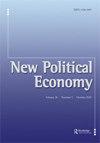Fictitious capital, the credit system, and the particular case of government bonds in Marx
IF 3.8
2区 经济学
Q1 ECONOMICS
引用次数: 3
Abstract
ABSTRACT This paper is a theoretical contribution to the development and update of Marx’s theory of money and credit, given the empirical developments in finance since the 1970s. It expands on the discussion of fictitious capital and government bonds within the Marxian literature. In contrast with most Marxian literature and some of Marx’s own writings on the topic, I argue that fictitious capital does not represent any real capital and then further develop the idea that fictitious capital is the channel through which the dominance of interest-bearing capital over other forms of capital occurs. This interpretation lays the foundation for understanding why government bonds, as titles of fictitious capital, are the keystone of financial markets and an unavoidable source for both financial accumulation and exploitation, rather than being a mere consequence of state spending. For this reason, public debt can neither be avoided nor fully paid off.马克思的虚拟资本、信用体系与政府债券个案
本文以20世纪70年代以来金融学的实证发展为背景,对马克思货币信贷理论的发展和更新做出了理论贡献。它扩展了马克思文学中关于虚拟资本和政府债券的讨论。与大多数马克思文学和马克思自己关于这一主题的一些著作相比,我认为虚拟资本并不代表任何真实的资本,然后进一步发展了这样一种观点,即虚拟资本是有息资本相对于其他形式资本占主导地位的渠道。这种解释为理解为什么政府债券作为虚拟资本的标题,是金融市场的基石,是金融积累和剥削的不可避免的来源,而不仅仅是国家支出的结果奠定了基础。因此,公共债务既无法避免,也无法完全偿还。
本文章由计算机程序翻译,如有差异,请以英文原文为准。
求助全文
约1分钟内获得全文
求助全文
来源期刊

New Political Economy
Multiple-
CiteScore
10.10
自引率
9.50%
发文量
41
期刊介绍:
New Political Economy aims to create a forum for work which combines the breadth of vision which characterised the classical political economy of the nineteenth century with the analytical advances of twentieth century social science. It seeks to represent the terrain of political economy scholarship across different disciplines, emphasising original and innovative work which explores new approaches and methodologies, and addresses core debates and issues of historical and contemporary relevance.
 求助内容:
求助内容: 应助结果提醒方式:
应助结果提醒方式:


